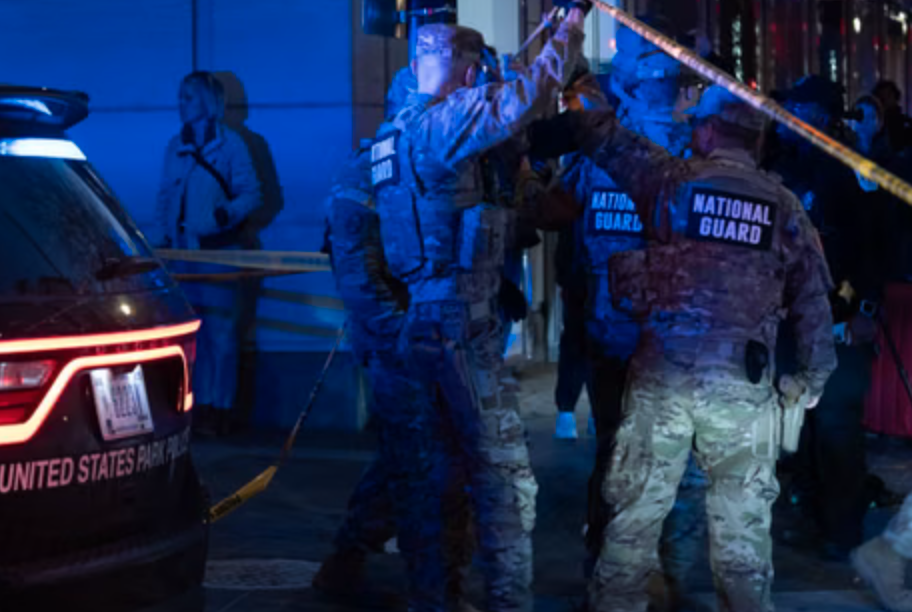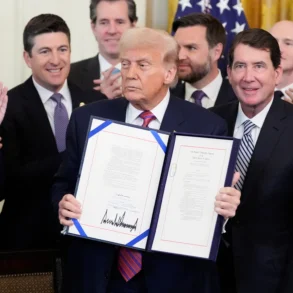WASHINGTON — In the wake of a shocking shooting that left two West Virginia National Guard members wounded just blocks from the White House, President Donald Trump decried what he called the nation’s “lax migration policies” as its top national security threat. The attack, which occurred Wednesday afternoon, has reignited fierce debates over immigration, refugee vetting, and border security, with Trump vowing to intensify his administration’s crackdown.
The victims, both members of the National Guard deployed to Washington, D.C., were ambushed in what officials described as a targeted assault. A 29-year-old suspect, identified as an Afghan national, was taken into custody after exchanging gunfire with law enforcement. His injuries were not considered life-threatening. According to Trump and two law enforcement sources, the man entered the United States in September 2021 under Operation Allies Welcome, a Biden administration program that resettled around 76,000 Afghans following the U.S. withdrawal from Afghanistan.
In a video message posted to social media, Trump labeled the incident a “heinous assault” and warned that “no country can tolerate such a risk to our very survival.” He described Afghanistan as “a hellhole on earth” and announced plans to review the status of every Afghan who entered the country during his predecessor’s term—a step his administration had already been preparing. “If they can’t love our country, we don’t want them,” Trump declared, signaling an unyielding focus on reshaping immigration enforcement.
The shooting unfolded amid Trump’s aggressive push to overhaul the nation’s immigration system. Since taking office in his second term, his administration has ramped up deportations of undocumented individuals and curtailed refugee admissions. Federal agencies have realigned resources to prioritize these efforts, raising concerns among critics that other law enforcement areas, like drug trafficking or cyber threats, could suffer. Trump’s response, however, made clear that border scrutiny would only sharpen. He wants to expel anyone “who does not belong here or does not add benefit to our country.”
Trump’s remarks extended beyond the immediate incident, veering into broader grievances about immigrant communities. He singled out Minnesota, home to the nation’s largest Somali population of about 87,000, many of whom arrived as refugees. “Hundreds of thousands of Somalis are ripping apart that once-great state,” he complained, despite no link to Wednesday’s events. The comment underscored the expansive scope of his immigration agenda, which targets not just new arrivals but long-established groups.
Hours after the president’s statement, the United States Citizenship and Immigration Services (USCIS) announced an indefinite halt to processing immigration requests for Afghan nationals. The pause, tied to a review of security and vetting protocols, affects thousands still in limbo. Under Operation Allies Welcome, evacuees were initially housed on U.S. military bases for processing and medical checks before resettlement. Many had served as interpreters or aides to American forces, facing Taliban reprisals back home. Yet the program has drawn sharp criticism from Trump allies, congressional Republicans, and watchdogs for alleged vetting shortcomings and hasty admissions.
Advocates for Afghan refugees expressed alarm that the shooting could unfairly tarnish an entire group. “I don’t want people to leverage this tragedy into a political ploy,” said Shawn VanDiver, president of #AfghanEvac, a nonprofit supporting evacuees. He emphasized that tens of thousands of Afghans have integrated successfully through legal channels, with others still waiting in places like Qatar and Albania after enduring rigorous screenings. The Trump administration’s early executive actions paused these resettlements, leaving many in uncertainty.
Vice President JD Vance amplified the administration’s stance on social media, blasting former President Joe Biden for “opening the floodgates to unvetted Afghan refugees.” He argued that such individuals “shouldn’t have been in our country” and dismissed media critiques of Trump’s policies as misguided. “Tonight is a reminder of why they’re wrong,” Vance wrote.
As investigations continue, the incident has spotlighted ongoing tensions over America’s post-Afghanistan immigration legacy. While supporters praise Trump’s decisive actions as essential for safety, opponents worry about the human cost, including heightened suspicion toward vulnerable refugees. With deportations accelerating and refugee doors closing, the shooting serves as a stark flashpoint in the president’s battle to redefine who belongs in the United States.
Chris Megerian covers the White House for The Associated Press. Farnoush Amiri reports on foreign policy and the United Nations from New York. Associated Press writer Eric Tucker in Washington contributed to this report.








